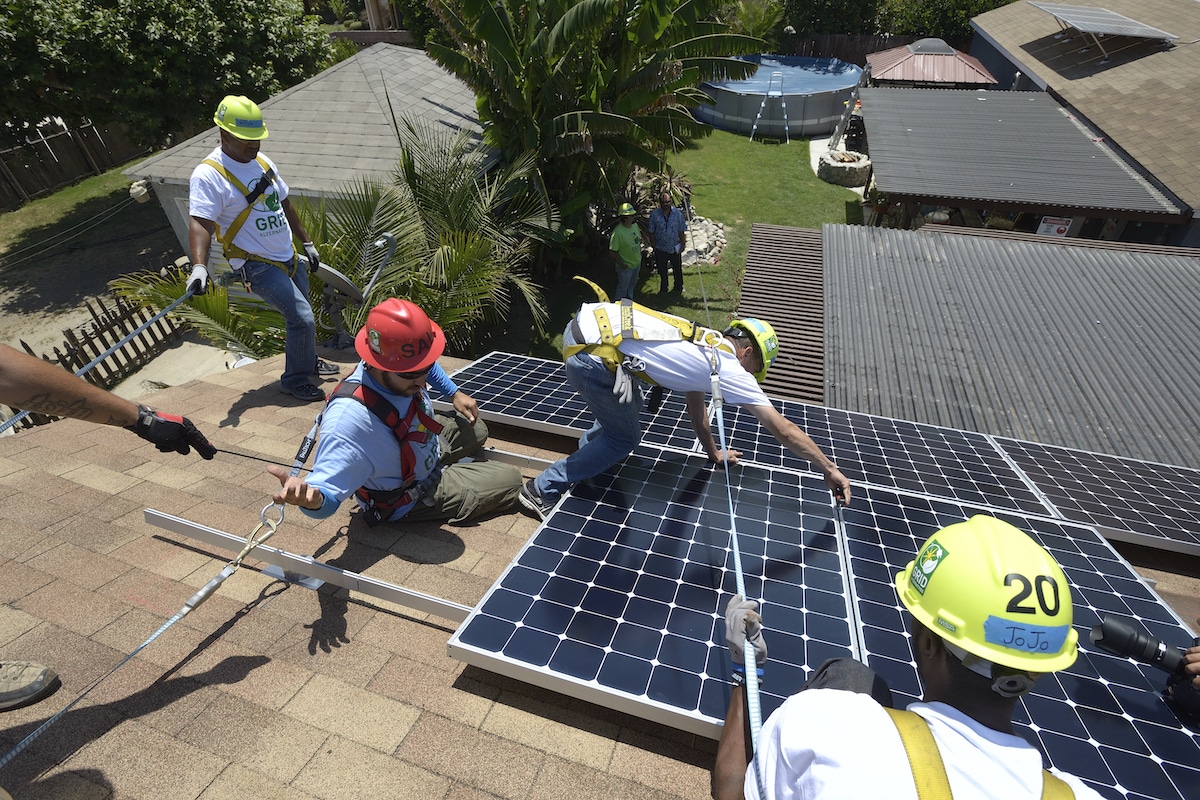EPA Announces $7 Billion in Solar Grants for Low-Income Communities

 Why you can trust us
Why you can trust us
Founded in 2005 as an Ohio-based environmental newspaper, EcoWatch is a digital platform dedicated to publishing quality, science-based content on environmental issues, causes, and solutions.
The U.S. Environmental Protection Agency (EPA) has announced the $7 billion Solar for All grants competition to increase affordable solar energy access to millions of low-income households, a press release from the EPA said.
As part of President Joe Biden’s Investing in America plan, the availability of more residential solar will provide lower-cost energy while leveling the renewable energy access playing field and helping to mitigate the climate crisis.
“For too long, overburdened communities on the front lines of the climate crisis have been left behind and locked out of clean energy investments and climate solutions,” said EPA Administrator Michael S. Regan in the press release. “Thanks to President Biden’s Investing in America agenda, this historic boost in solar investments will advance millions of residential solar projects nationwide, protect people and the planet, deliver environmental justice, save families money, and create good-paying jobs. All communities deserve to participate in America’s growing clean energy economy and under this competition, we will bring more communities along, working together to build a healthier and cleaner future for all.”
The Solar for All grants competition was created by the Inflation Reduction Act’s Greenhouse Gas Reduction Fund (GGRF) and will award as many as 60 grants to states, Tribal governments, territories, municipalities and eligible nonprofits to help expand solar investment in disadvantaged and low-income communities. The grants will be used to expand and create solar programs that provide technical assistance like workforce development and financing so that these communities can benefit from residential solar.
“At a time when people are struggling to make ends meet, all while dealing with the existential threat of climate change, we must make residential rooftop solar a reality for low-income and working families that need it most,” said U.S. Senator from Vermont Bernie Sanders in the press release. “This $7 billion residential solar program that I introduced and the EPA is administering is a major step in the right direction.”
Funds will be given by the grant competition for expanding solar programs that already exist, as well as for developing and installing new ones in low-income neighborhoods across the country. One of the ways Solar for All programs provide equitable access for low-income households is by providing financial incentives and support in communities that were previously unable to obtain investment funding.
The programs also ensure low-income residents can reap the rewards of solar including saving money, energy security and resiliency and community ownership.
“Solar for All will accelerate the deployment of residential solar in communities that for too long have lacked access to the cost-saving benefits of clean energy generation at home,” said Jahi Wise, senior advisor and acting director of the Greenhouse Gas Reduction Fund. “The Solar for All program strengthens low-income and disadvantaged community-focused solar programs across the country, bringing long-needed cost-savings and pollution reduction to American communities.”
Residential solar reduces energy bills, and Solar for All guarantees a minimum 20 percent in savings on energy bills for all the households participating in the program.
The program will create more clean energy jobs while reducing carbon emissions and improving air quality.
Solar for All helps to advance Biden’s Justice40 Initiative, which has a goal of 40 percent of the benefits of specific federal investments going to underserved and marginalized communities that have been overburdened by pollution.
The program will also advance Biden’s objective of a power sector free of carbon pollution by 2035, as well as a net-zero economy by 2050.
Solar for All will fund workforce development programs that train workers from disadvantaged and low-income communities to deploy residential solar.
“As we work to build a clean energy future, we must do so in a way that benefits all Americans — no matter their zip code or income,” said U.S. Senator Tom Carper from Delaware, who is also the chairman of the Senate Environment and Public Works Committee, in the press release. “I’m pleased that the Biden-Harris administration’s Solar for All grant program is going to help deploy clean energy to millions of households, lowering energy costs and creating good-paying jobs across our nation.”
There are three award options for the grants, including awards for specific states or territories, awards for Alaska Native and American Indian communities and awards for programs serving similar communities facing similar barriers to residential solar in multiple states.
The Notice of Intent deadline for the Solar for All grants is July 31 for the District of Columbia, U.S. states and Puerto Rico; August 14 for Guam, American Samoa, the Virgin Islands and the Commonwealth of the Northern Mariana Islands; and August 28 for Intertribal Consortia and Tribal governments.
The application deadline for the grants is September 26, 2023.
A recording of the public briefing on the Notice of Funding Opportunity will be available on the EPA’s GGRF website. There will also be an informational webinar on the competition from 1 to 3 p.m. on July 12. You can register here for the webinar, which will also be posted on the GGRF website. The website includes resources and tools for applicants.
More information can be found at grants.gov.
“We will never achieve our clean energy future without taking steps to support our low-income, frontline communities and ensure they have the investments and resources they need to thrive,” said Congressman Paul Tonko of New York in the press release.
Subscribe to get exclusive updates in our daily newsletter!
By signing up, you agree to the Terms of Use and Privacy Policy & to receive electronic communications from EcoWatch Media Group, which may include marketing promotions, advertisements and sponsored content.

 233k
233k  41k
41k  Subscribe
Subscribe 




